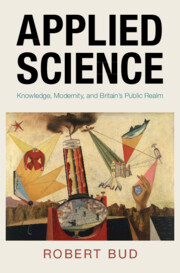Book contents
- Applied Science
- Science in History
- Applied Science
- Copyright page
- Dedication
- Contents
- Figures
- Acknowledgements
- Introduction
- Stage 1 Origins and Pedagogy in the Nineteenth Century
- 1 Applied Science Conceived
- 2 Applied Science Institutionalised
- 3 Competing Concepts of Applied Science and Technology
- Stage 2 Research in the Early Twentieth Century
- Stage 3 After World War Two
- Archives Used
- References
- Index
1 - Applied Science Conceived
The Early Nineteenth Century
from Stage 1 - Origins and Pedagogy in the Nineteenth Century
Published online by Cambridge University Press: 15 March 2024
- Applied Science
- Science in History
- Applied Science
- Copyright page
- Dedication
- Contents
- Figures
- Acknowledgements
- Introduction
- Stage 1 Origins and Pedagogy in the Nineteenth Century
- 1 Applied Science Conceived
- 2 Applied Science Institutionalised
- 3 Competing Concepts of Applied Science and Technology
- Stage 2 Research in the Early Twentieth Century
- Stage 3 After World War Two
- Archives Used
- References
- Index
Summary
This chapter addresses the question: How did the term become familiar in society? Even the earliest uses demonstrate the integration of knowledge classification and engagement with large audiences. Derived from German usage, the term ‘applied sciences’ was coined early in the nineteenth century by the poet Samuel Taylor Coleridge. It was key to underpinning a major new encyclopaedia project intended to structure knowledge and thinking. A succession of loyal editors realised his vision as the massive Encyclopaedia Metropolitana, advertised using Coleridge’s coinage. It would also be taken up by King’s College London seeking to describe its course teaching knowledge underlying engineering without claiming to be technical training. Meanwhile, the chemist J. F. W. Johnston used the term to promote the services he offered farmers. During and after debates over Corn Law Repeal, the press discussed Johnston’s applied science as a potential saviour of agriculture. The term’s use then snowballed.
Keywords
- Type
- Chapter
- Information
- Applied ScienceKnowledge, Modernity, and Britain's Public Realm, pp. 19 - 43Publisher: Cambridge University PressPrint publication year: 2024

